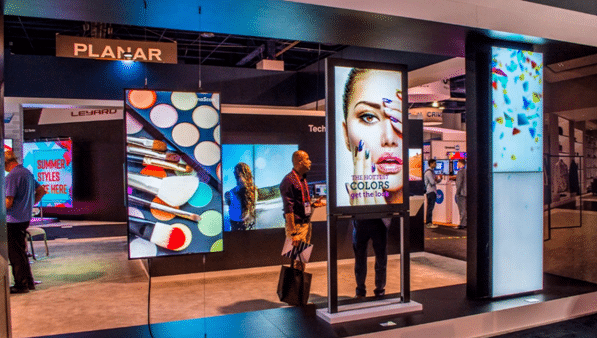The Big Players in Digital Ads

The digital advertising landscape is an ever-evolving and highly competitive realm, with a diverse range of players vying for a share of the market. From tech giants to specialized startups, the industry is characterized by its dynamism and constant innovation. In this article, we delve into the world of digital advertising, shedding light on the key players, their strategies, and the impact they have on the global digital ecosystem.
Tech Titans: Shaping the Digital Advertising Scene

When it comes to digital advertising, a handful of tech giants dominate the scene. These companies have built extensive ecosystems, offering a range of services that seamlessly integrate with their advertising platforms. Let’s explore some of these tech titans and their influence.
Google: The Search Engine Giant
Google, the ubiquitous search engine, is a powerhouse in the digital advertising world. With its extensive reach and sophisticated algorithms, Google AdWords has become a staple for businesses of all sizes. The platform allows advertisers to target specific keywords, demographics, and even geographic locations, ensuring highly relevant ad placements.
Google's Display Network further expands its reach, offering advertisers access to a vast network of websites and apps. This network includes YouTube, the world's largest video-sharing platform, providing advertisers with an additional channel to engage with their audience through video ads.
| Platform | Reach (Monthly Users) |
|---|---|
| Google Search | 3.5 billion |
| Google Display Network | 2.8 billion |
| YouTube | 2.3 billion |

Facebook: Social Media Advertising Powerhouse
Facebook, the social media giant, has revolutionized digital advertising with its highly targeted and personalized ad options. With over 2.8 billion monthly active users, Facebook offers advertisers an unprecedented opportunity to reach their target audience with precision.
Facebook's advertising platform allows for granular targeting based on demographics, interests, behaviors, and even specific life events. This level of precision ensures that ads are highly relevant to users, increasing the likelihood of engagement and conversion.
Additionally, Facebook's acquisition of Instagram has further expanded its reach and influence. Instagram, with its visually appealing feed, provides a unique platform for advertisers to showcase their products and services through eye-catching visuals.
| Platform | Monthly Active Users |
|---|---|
| 2.8 billion | |
| 1.3 billion |
Amazon: E-commerce’s Advertising Juggernaut
Amazon, the e-commerce behemoth, has emerged as a significant player in the digital advertising space. With its vast marketplace and extensive user data, Amazon offers advertisers a unique opportunity to reach shoppers at various stages of the buying journey.
Amazon's advertising platform allows advertisers to target users based on their search history, purchase behavior, and even specific product categories. This level of precision enables businesses to promote their products to highly relevant audiences, increasing the chances of successful conversions.
Additionally, Amazon's Sponsored Products and Display Ads provide opportunities for brand awareness and product visibility, helping businesses stand out in a crowded marketplace.
| Platform | Monthly Visitors |
|---|---|
| Amazon | 300 million |
Specialized Startups: Disrupting the Industry

While tech giants dominate the digital advertising landscape, a wave of specialized startups has emerged, offering innovative solutions and challenging the status quo. These startups bring fresh perspectives and unique value propositions to the industry.
Programmatic Advertising Platforms
Programmatic advertising has revolutionized the way digital ads are bought and sold. Startups like The Trade Desk and AppNexus have developed sophisticated platforms that automate the ad buying process, leveraging real-time data and machine learning algorithms.
These platforms enable advertisers to efficiently manage and optimize their campaigns across multiple channels and publishers, ensuring maximum reach and effectiveness. The use of real-time bidding (RTB) allows advertisers to bid on ad impressions with precision, targeting specific audiences and contexts.
Native Advertising Specialists
Native advertising, which blends promotional content with the user experience, has gained traction in recent years. Startups like Outbrain and Taboola have mastered the art of native advertising, offering advertisers the ability to seamlessly integrate their content with relevant publisher sites.
By delivering ads that resemble the surrounding content, these platforms increase user engagement and reduce ad blocking. This approach not only provides a better user experience but also enhances the effectiveness of advertising campaigns.
Influencer Marketing Platforms
Influencer marketing has become an increasingly popular strategy for brands to reach their target audience. Startups like InfluencerDB and Traackr have developed platforms that connect brands with influencers, facilitating authentic and effective collaborations.
These platforms leverage data analytics to identify influencers with the right reach and engagement, ensuring that brands can partner with influencers who align with their brand values and target audience. This approach adds a layer of authenticity and trust to advertising campaigns.
The Impact of Digital Advertising on Businesses
The rise of digital advertising has had a profound impact on businesses of all sizes. It has empowered them to reach a global audience, target specific demographics, and measure the effectiveness of their campaigns with precision.
Digital advertising allows businesses to test and iterate their strategies quickly, optimizing their approach based on real-time data. This agility has become a key differentiator, enabling businesses to stay ahead of the curve and adapt to changing market dynamics.
Furthermore, the ability to track and analyze user behavior has provided businesses with valuable insights into their target audience's preferences and pain points. This data-driven approach has revolutionized marketing strategies, allowing businesses to create highly personalized experiences that resonate with their customers.
Future Implications and Industry Trends
The digital advertising landscape is poised for continued growth and innovation. As technology advances, we can expect to see further advancements in areas such as artificial intelligence, machine learning, and data analytics.
The rise of voice search and the Internet of Things (IoT) presents new opportunities and challenges for digital advertisers. Understanding how users interact with these emerging technologies will be crucial for businesses to stay relevant and effective in the digital realm.
Additionally, the ongoing debate surrounding user privacy and data protection is likely to shape the future of digital advertising. As regulations like GDPR and CCPA come into effect, advertisers will need to adapt their strategies to comply with these regulations while still delivering targeted and personalized experiences.
How do tech giants like Google and Facebook maintain their dominance in the digital advertising space?
+Tech giants like Google and Facebook maintain their dominance through a combination of factors. They have built extensive ecosystems with a wide range of services, including search engines, social media platforms, and e-commerce marketplaces. This integration allows them to offer advertisers a comprehensive suite of tools for targeting and reaching their audience. Additionally, their vast user bases provide an extensive reach, ensuring that ads are seen by a large and diverse audience.
What are some challenges faced by specialized startups in the digital advertising industry?
+Specialized startups in the digital advertising industry often face challenges related to scaling their operations and competing with established players. They need to invest in robust infrastructure and talent to keep up with the demand for their services. Additionally, they must continuously innovate and adapt to changing market trends and user preferences to stay relevant and attract advertisers.
How has digital advertising impacted small and medium-sized businesses (SMBs)?
+Digital advertising has had a transformative impact on SMBs. It has provided them with an affordable and effective way to reach a global audience, compete with larger brands, and measure the success of their marketing efforts. The ability to target specific demographics and track user behavior has allowed SMBs to refine their strategies and allocate their marketing budgets more efficiently.



